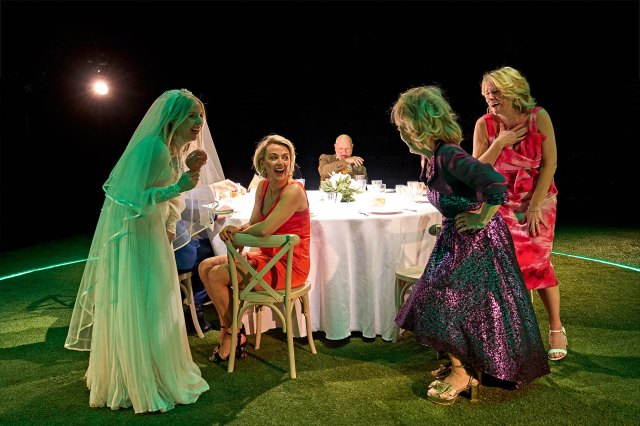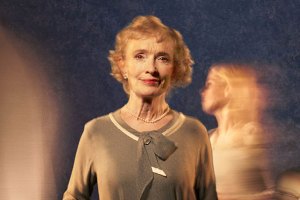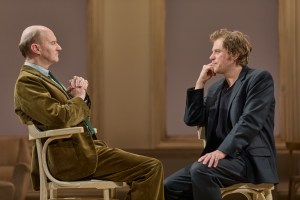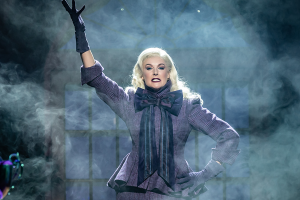Till the Stars Come Down at the National Theatre – review
Bijan Sheibani’s production runs at the Dorfman Theatre until 16 March

Beth Steel’s new play Till the Stars Come Down is a blistering comedy, full of the deepest, saddest truths about life and love. With its three sisters, regional setting and depiction of doomed love in a changing world, it’s Chekhov on Heineken – reaching the parts other plays don’t reach.
It’s set at a family wedding in Mansfield, a former mining town in the de-industrialised heart of Britain and it uses that particularity to create an entirely recognisable world from which its universality springs. This is, writ large, a wedding we’ve all been to, where under the influence of too much alcohol and excess feeling, uncomfortable reunions and strained relationships crack open to tear apart the bonhomie.
Here the tensions are there from the start as sisters gentle, tentative Sylvia (Sinéad Matthews), bossy mother-of-two Hazel (Lucy Black) and bold Maggie (Lisa McGrillis) gather on a hot summer’s day to do their hair and get dressed up. Sylvia is marrying Polish Marek, and Hazel can’t resist a few digs at the way the Eastern Europeans look after their own at the warehouse where she works or at four-times married – “but only to three husbands” – Maggie who has returned home for the event.
The dialogue is raucous and sharp, laugh-out-loud funny especially when Aunty Carol arrives, in a breathless whirl of activity. Lorraine Ashbourne gives the character the timing of a stand-up comedian, and the energy of an over-excited puppy; she powers every scene she appears in.
The wonder of the writing is its precision, the way it manages to convey the tug and thrust of women talking to one another – about their neighbours (“next door’s got a sex pond”), the worry of ageing, and a wedding dress that doesn’t fit (“Have you had a poo?” suggests Carol. “She can’t shit hersen two-inch thinner,” fires back Hazel), while at the same time gently raising the themes of overwhelming loss and unstoppable change that will shape the play.
Designer Samal Blak has set the action in the round, on a circle of astroturf, enclosed by a band of Paule Constable’s mood-sensitive lighting. As the wedding unfolds, and events spin out of control, the stage spins too. It is both a cockpit where fights take place and a symbol of the universe itself, where planets dance around each other in constant motion, while individuals feel they are still.
At one moment, Pete (Philip Whitchurch, estranged brother of the bride’s father, Tony, played by Alan Williams) sets up the guests like a living planetarium, sending them circling one another, a human science experiment. It’s beautifully choreographed (movement direction by Aline David), deeply moving, and sends off as many rays of light as the glitter ball turning overhead.
The sensational quality of Steel’s writing is that it has this same ability to illuminate fragments and then bring them together as a whole. She sets multiple hares running – the long legacy of the miners’ strike makes its appearance, as does lost love, missed chances, cancer, archaeology and the age of the ground beneath our feet. She sets up plots that flicker and vanish and then brings about the combustible climax with a device that is possibly too obvious.
Yet somehow, with the help of Bijan Sheibani’s brilliantly detailed and sensitive direction, she pulls the entire thing together into a whole that reflects the difficulty and complexity of families making their way in a world that is always changing. The charged ending brings the three sisters back on stage together, facing a future in which all their certainties have been ripped apart and it’s somehow still on the brink of something, a possibility not a closure.
This sense of vitality fills the entire play and the richness of every character from Mark Wootton’s sentimental bridegroom Marek, to Derek Riddell’s disappointed John, to Ruby Stokes’ confused, melancholy teenager Leanne, gives a superb ensemble cast roles to play with their entire heart and soul. Their warmth, their subtlety and their ability to portray a family in love and at war make this rewarding, utterly unmissable play a theatrical event to remember. It’s sensational.




















